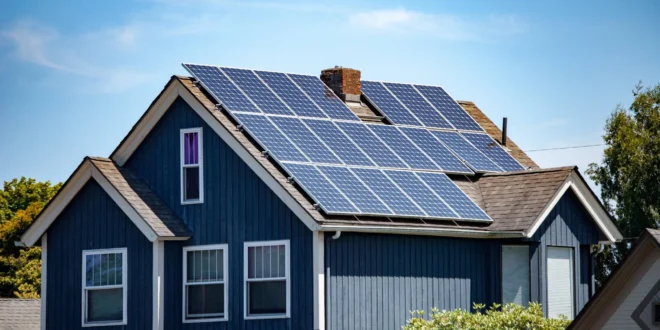It’s no secret… clean energy technology is moving fast, and solar energy is one of the best ways to heat, cool, and power your home. But as you plug into this alternative energy technology, you want to be sure it’s a good investment and a wise choice for your home.
Depending on where you live, the amount of sunlight your property receives can determine if solar is a smart move for your household. However, there are some clear disadvantages to solar energy, even in the best solar locations.
To be aware, read on and we’ll cover the 7 disadvantages of solar energy.
1. High Initial Cost
While solar energy is an environmentally friendly and renewable source of energy, a significant disadvantage that all homeowners should be aware of is the high initial cost. Installing a solar panel system can be quite expensive. This makes it a major deterrent for many homeowners.
However, it is important to consider the good side of this initial investment. Solar energy can greatly reduce or even eliminate monthly electricity bills. It ultimately leads to significant cost savings in the long run.
2. Intermittent Energy Production
Having intermittent energy production means that solar panels only generate electricity when the sun is shining. This can be a problem during cloudy days or at night. It can also cause fluctuating energy levels throughout the day.
Power can be problematic during times of high energy demand. This happens in the evenings when households typically use more electricity. To combat this issue, homeowners may need to invest in expensive battery storage systems. They might also need to rely on traditional energy sources.
The intermittent nature of solar energy can also make it less reliable for powering essential appliances or meeting the needs of larger households. However, solar energy can still be stored in batteries for later use. This reduces the reliance on traditional energy sources and lowers electricity bills.
3. Weather Dependency
One major disadvantage that all homeowners should be aware of is its dependency on weather conditions. Solar panels require sunlight to generate electricity. This means that days with limited sunshine or cloudy weather can result in a decrease in energy production.
This can be a major issue for homeowners in areas with frequent cloudy weather or long winter seasons. Additionally, extreme weather events such as hurricanes or heavy snowfall can cause damage to solar panels. This can further affect energy production.
Homeowners considering solar energy must carefully consider and plan for these weather-dependent limitations. They should carefully consider the location of their home before investing in solar energy, as it may not be the most practical or reliable option in certain climates.
It’s also best to check on local government incentives and the expected solar payback period by state. That way, you can weigh if the benefits outweigh the cost and concern about weather dependency.
4. Space Requirements
Installing a solar system on your roof or property requires a significant amount of space. This of which may not be feasible for those living in smaller homes or densely populated areas.
Depending on the size of the home and their energy needs, homeowners may need to install a large number of solar panels. This can take up a considerable amount of space on their property.
However, it is important to also consider the many benefits of solar energy. The good side of installing solar energy includes reducing your carbon footprint, lowering your energy bills, and potentially even earning money by selling excess energy back to the grid.
Additionally, advancements in solar technology have made it possible to use smaller, more efficient panels, making it more accessible for homeowners with limited space.
5. Aesthetic Concerns
While solar panels are a great way to generate clean, renewable energy, they may not be visually appealing to everyone. The rectangular panels can be perceived as bulky. It may not fit in with the aesthetic of a home.
Additionally, some homeowners associations may have strict rules and regulations regarding solar panel installation, which can limit a homeowner’s ability to fully utilize solar energy. It is important for homeowners to consider the visual impact of installing solar panels on their homes and to research any potential restrictions before making a decision.
However, it is important to note that the benefits of solar energy far outweigh these disadvantages. Many advancements have been made in the design of solar panels, making them sleeker and more visually appealing.
6. Energy Storage Costs
While solar panels can generate electricity during the day, they are not able to produce energy at night or during cloudy days. This makes it necessary for homeowners to invest in energy storage systems, such as batteries. The initial cost of a solar battery can be expensive.
Additionally, these systems need to be regularly maintained and replaced. This adds to the overall cost of utilizing solar energy. Homeowners should carefully consider these energy storage costs before deciding to switch to solar energy.
However, it’s important to note that only does it provide sustainable and renewable energy. It also reduces reliance on traditional energy sources as it helps to combat climate change. With advancements in technology, the cost of solar energy storage may also be decreasing, making it a more practical option for homeowners.
7. Environmental Impact
While solar energy is often marketed as a clean and renewable source of energy, the production and disposal of solar panels can hurt the environment. The manufacturing process involves the use of toxic chemicals and hazardous materials. This can harm surrounding ecosystems and pollute water sources.
Additionally, once solar panels reach the end of their lifespan, they can be difficult to recycle. This leads to a buildup of electronic waste. Therefore, homeowners need to consider the environmental implications of solar energy before deciding to install it in their homes.
However, by using solar power, homeowners can reduce their dependence on fossil fuels and decrease air and water pollution. It is crucial to consider both the challenges and benefits of solar energy to make informed and responsible decisions for our homes and the environment.
Understand the 7 Disadvantages of Solar Energy
While solar energy has numerous benefits for homeowners, it’s important to also consider the potential 7 disadvantages of solar energy. These include high upfront costs and limited efficiency in certain areas.
However, with advancements in technology and government incentives, solar energy is becoming an increasingly viable option. To make an informed decision, research and carefully weigh the pros and cons before making the switch to solar.
Your wallet and the planet will thank you for it. And, if you want to read more, visit our blog!
 SlushWeb Bringing Facts to Light
SlushWeb Bringing Facts to Light



